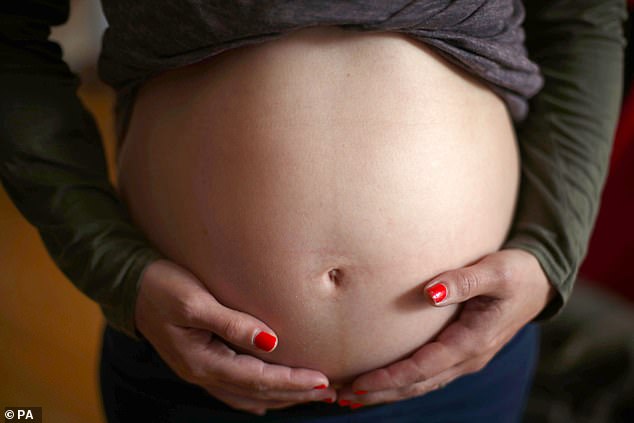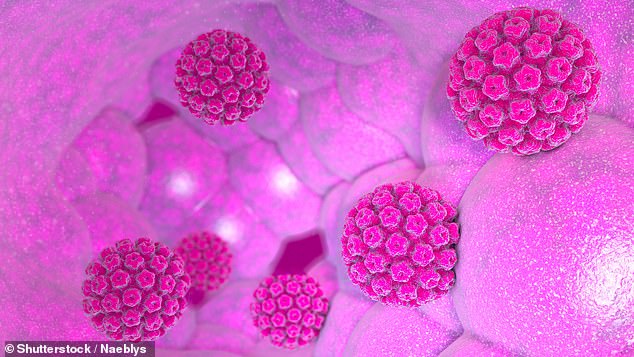Mothers-to-be infected with human papillomavirus (HPV) are nearly four times more likely to have a premature baby, a study has suggested.
Canadian academics found a ‘significant’ link between pregnant women giving birth early and HPV types 16 and 18, which cause 70 per cent of cervical cancers.
Eight out of 10 people will be infected at some point in their life with HPV, which is usually spread through sex.
Experts at the University of Montreal have yet to pinpoint any reason as to why being infected may drive up the risk of premature birth.
But they suggested the virus may cause changes in the vaginal microbiome, which could trigger inflammation and lead to an early delivery.
Genital tract viruses – the most common of which is HPV – could also leave women more susceptible to bacterial infections which can trigger pre-term labour, medics said.
If a causal link is confirmed, then a HPV vaccine may reduce preterm birth rates and the ‘associated burden’ on health services, the scientists said.
Preterm birth is one of the leading causes of death among newborns and can cause lifelong health problems.
In the UK, one in every 13 babies is born premature – classified as before week 37 of pregnancy – while the figure for the US is one in 10.

A total of 60,000 babies are born prematurely in the UK every year, equating to around eight in every 100 births (file)

Eight out of 10 people will be infected at some point in their life with HPV, which is usually spread through sex
The cause is a mystery for the majority of premature births, but smoking as well as conditions such as diabetes have been linked to early labour.
Long-term effects for children born preterm include disabilities related to learning, seeing and hearing.
WHAT IS HPV? THE INFECTION LINKED TO 99% OF CERVICAL CANCER CASES
Human papilloma virus (HPV) is the name for a group of viruses that affect your skin and the moist membranes lining your body.
Spread through vaginal, anal and oral sex and skin-to-skin contact between genitals, it is extremely common.
Up to eight out of 10 people will be infected with the virus at some point in their lives.
There are more than 100 types of HPV. Around 30 of which can affect the genital area. Genital HPV infections are common and highly contagious.
Many people never show symptoms, as they can arise years after infection, and the majority of cases go away without treatment.
It can lead to genital warts, and is also known to cause cervical cancer by creating an abnormal tissue growth.
Annually, an average of 38,000 cases of HPV-related cancers are diagnosed in the US, 3,100 cases of cervical cancer in the UK and around 2,000 other cancers in men.
What others cancers does it cause?
ThroatNeckTongueTonsilsVulvaVaginaPenisAnus
Advertisement
Several animal studies have linked HPV with pregnancy risks but research in humans has provided mixed results.
In the study, published in the journal JAMA Network Open, Dr Helen Trottier and her team studied 899 pregnant women aged 19-47 at three hospitals from 2010 to 2016.
They wanted to determine if there was a link between HPV and women giving birth early, which they classified as 20 to 37 weeks after conception.
The average pregnancy lasts 40 weeks, around nine months.
This research is of the ‘utmost importance’ due to HPV prevalence being the highest in women in the age group with the highest birth rate (25 to 34-years-old), they said.
The virus – which can be found in the mouth and throat as well as genitals – is often harmless for the majority and goes away on its own in most cases.
Of the participants, 378 (42 per cent) had HPV in vaginal samples taken during the first trimester.
The majority of these women (68 per cent) were still infected in their third trimester.
Some 55 participants gave birth early – at an average of 36 weeks conception – 38 of which happened naturally, while 17 were medically induced.
The researchers did not find an overarching link between all types of HPV vaginal infection in the first trimester and preterm birth.
However, women infected with HPV type 16 or 18 during the first trimester were 2.6 times more likely to give birth preterm.
And those who had a persistent infection throughout their pregnancy were 3.7 times more likely to give birth early, analysis suggested.
The researchers said: ‘Even in a population considered to be at low risk based on sociodemographic and sexual history characteristics, HPV infection is frequent in pregnancy, and most HPV infections detected in the first trimester persist to the third trimester.’
Previous studies had found a much weaker link between the virus and early birth, but some of these only examined a limited number of HPV types or did not take factors such as age and medical history into account, they said.
‘All of those factors may have been associated with a biased, lower estimate of the association between HPV infection and preterm birth,’ the team added.
Source link : https://www.dailymail.co.uk/news/article-9993405/Mothers-infected-HPV-FOUR-TIMES-likely-premature-baby-study-claims.html











